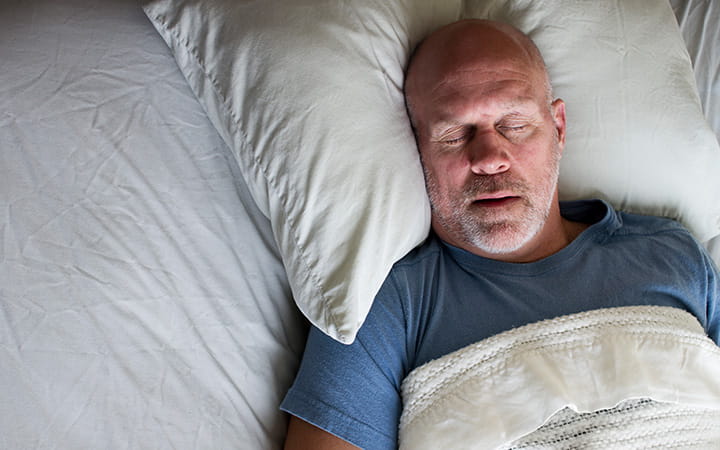Q & A: What Happens During a Sleep Study?
April 13, 2020

If you have a sleep disorder, you might undergo a sleep study, in which sleep medicine specialists use painless, noninvasive technology to closely monitor the physiological signs you exhibit during the different stages of sleep. These measurements include:
- Airflow monitoring
- Chest wall movement
- Brain wave activity
- Heart rate and rhythm
- Pulse oximetry to check oxygen status
- Muscle tone/activity
- Arousals/awakenings from sleep
- Limb movements during sleep
What else is involved? How should you prepare? Can you do it at home? UH sleep medicine specialist Sally Ibrahim, MD, answers these questions and more.
Q: Where would I undergo a sleep study?
A: Sleep studies can be done at home or in the laboratory setting.
Q: What about sleep testing at home?
A: Home sleep apnea testing with limited sensors can be reliable for people with a high probability of having obstructive sleep apnea. People with two or more of these criteria are at higher risk of obstructive sleep apnea: loud snoring, frequent tiredness, high blood pressure or apnea, which is when you choke, gasp or stop breathing in your sleep. When a home sleep apnea test is performed properly, we can reliably diagnose obstructive sleep apnea.
A failed home sleep apnea testing is one in which data could not be achieved accurately. A negative home sleep apnea test is one where obstructive sleep apnea was not found, but there remains high suspicion that this is the cause.
For those with a failed or negative home sleep apnea test who have suspected obstructive sleep apnea, we move to using the sleep laboratory, which is the gold standard.
Home sleep apnea testing is inappropriate for other sleep disorders, as it does not detect brain wave activity, limb movements and other measurements. In-lab testing is needed for these disorders.
Some insurers do not cover home sleep apnea testing, so check with your sleep specialist to learn whether your home sleep test would be covered.
Q: If you have a positive home sleep apnea test, do you have to have it confirmed in a sleep lab study?
A: Unless there are abnormal findings that need to be looked at further, you don’t need it confirmed with an in-lab study.
Q: How long does a sleep study take? When do you arrive and leave?
A: For in-lab sleep studies, the patient comes in for a night. Usually this is sometime between 7:30 to 9 p.m. until the following morning. We also perform studies for shift workers at their usual sleep times, which may be during the day, on an as-needed basis.
Q: Is any prep required?
A: It’s basically like spending the night in a hotel, so prepare as you would for an overnight stay. One common question is regarding medications. You take your usual medications and do everything like you would normally, except that you go to the lab to sleep. It’s preferred that you don’t nap during the day of the sleep test so that you’re tired enough to fall asleep on the night of testing.
Q: Do you get a sleep aid for a sleep study?
A: If you use a sleep aid at home, we generally encourage continuation for the night of the sleep study. The only exception is when there is a medical consultation with a sleep physician before testing, who may feel testing will be more appropriate without medications. This is individualized for each patient after careful consideration of the risks and benefits.
Q: Can a sleep test diagnose anything beyond obstructive sleep apnea?
A: Yes. For in-lab sleep studies, we are looking at cardiopulmonary disorders, limb movements of sleep, sleep-related movement disorders, source of arousals and sleep architecture, parasomnias such as REM sleep behavior disorder, and much more. The in-lab test is the most comprehensive sleep test for evaluating these problems, compared with the home sleep apnea test, which is used onlyto confirm suspected obstructive sleep apnea.
Q: Do I need a sleep study if I have insomnia?
A: For most cases of insomnia, a sleep study is not indicated. However, if you keep waking up in the middle of the night and have a sleep maintenance issue, a study may help us understand the sources of awakenings. Your doctor can help you sort this out.
Q: Is a sleep study different for kids?
A: Yes. Conducting studies in children, scoring studies in children and interpretation of studies in children are all uniquely different and require the expertise of a pediatric sleep physician to accurately identify critical details of a study, as well as make the appropriate determinations.
For children, in-lab sleep studies are the standard of care. Most home studies in children are unreliable at this time. Children also require other measurements, such as measurement of carbon dioxide.
We have a dedicated pediatric sleep team at UH to ensure accurate and quality testing in children. Children with special needs or who have anxiety about testing may need additional support. We have a pediatric sleep nurse team of educators to pre-plan a sleep study, as well as the support of a child life specialist. Our technologists have special training to perform studies in children.
Related links
Our team of pulmonary specialists provides care for even the most complex pulmonary and sleep disorders, including a focused approach for the diagnosis, treatment and disease management of many chronic pulmonary conditions. Learn more about Pulmonary and Sleep Services at University Hospitals.
Tags: Sleep


